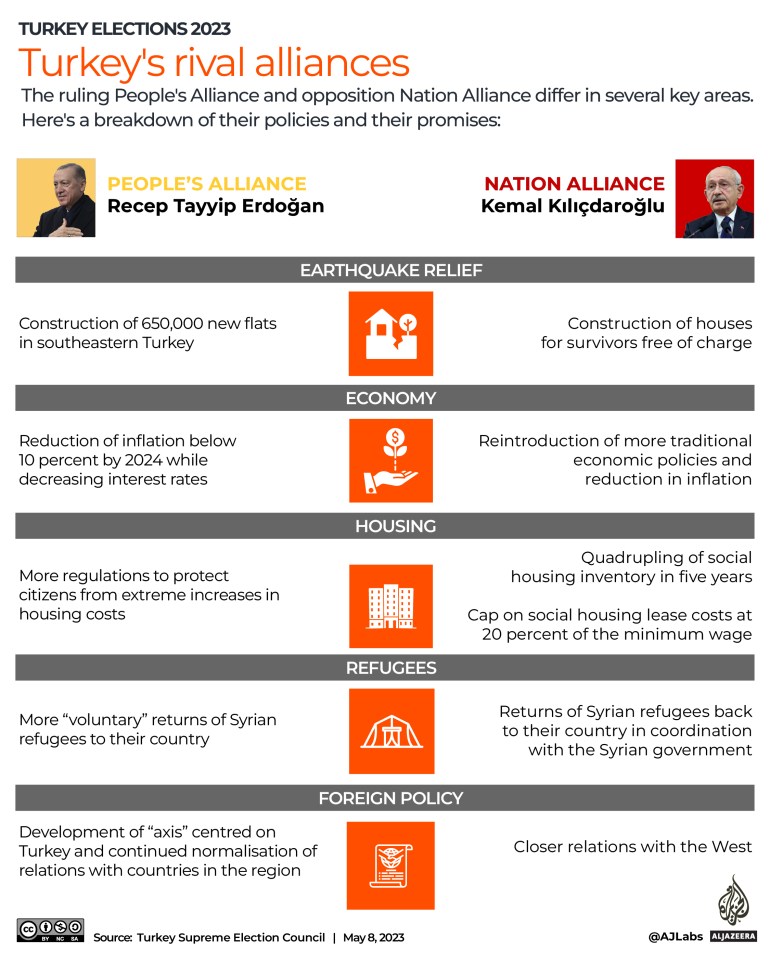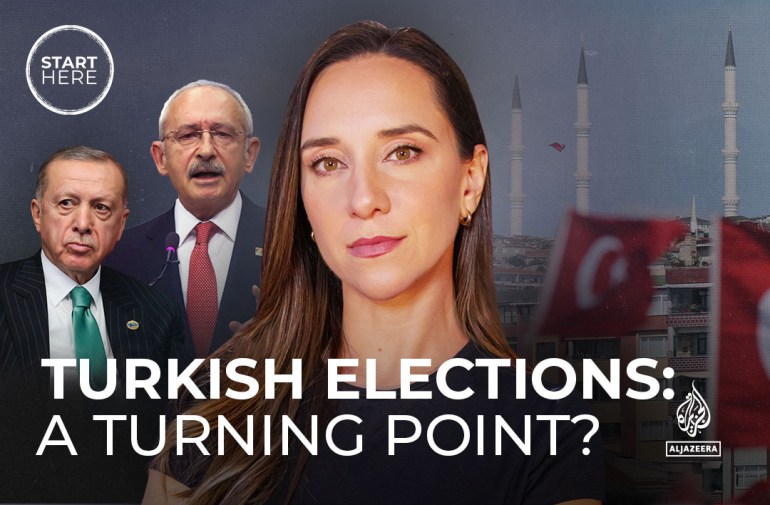What Turkey’s elections mean for Sweden’s NATO membership
After months of waiting, Swedish hopes are high for Turkey’s ratification after Sunday’s vote.
![Turkish President Tayyip Erdogan, Finland's President Sauli Niinisto, Sweden's Prime Minister Magdalena Andersson and NATO Secretary General Jens Stoltenberg deliver a statement during a NATO summit in Madrid, Spain [File:Violeta Santos Moura/Reuters]](/wp-content/uploads/2022/06/2022-06-28T182148Z_1300805050_RC261V93YS7S_RTRMADP_3_NATO-SUMMIT.jpg?resize=770%2C513&quality=80)
Turkey’s voters head to the polls on Sunday in an election that will not only determine the country’s domestic policies but could also influence Sweden’s NATO membership.
After Russia invaded Ukraine, Finland and Sweden abandoned decades of military neutrality and applied a year ago to join the world’s largest military alliance in an effort to fortify their borders.
Keep reading
list of 3 itemsFinland joins NATO as Russia’s war rages on in Ukraine
Turkey election: A guide to Erdogan’s biggest test at the polls
While most NATO members were quick to ratify the two Nordic nations’ membership applications, Turkey and Hungary held back.
Turkish President Recep Tayyip Erdogan accused both countries, especially Sweden, of providing safe haven to members of the Kurdistan Workers’ Party (PKK) and the Democratic Union Party (PYD) in Syria, both of which Ankara considers “terrorists”.
Erdogan also called on Finland and Sweden to lift an arms embargo on Turkey they had imposed in 2019 after Ankara’s incursion into northern Syria.
He said these were important “security concerns” for Turkey that had to be resolved before he agreed to NATO’s enlargement.
The three nations signed an agreement on the sidelines of the NATO summit in Madrid last year, in which Finland and Sweden pledged to address Turkey’s security demands.
Since then, Finland and Sweden have lifted the arms embargo, focussed on extraditing suspects with links to the PKK, and Stockholm has passed an anti-terrorism law.
But Turkey has only ratified Finland’s NATO membership. Erdogan has said Sweden has not yet met all of his country’s demands.
Right-wing demonstrations in Sweden involving the burning of the Quran and a mock hanging of Erdogan led to further tensions, and their NATO dialogue has stalled.
After a meeting with German Chancellor Olaf Scholz in Berlin in March, Swedish Prime Minister Ulf Kristersson told reporters that he hoped Turkey would ratify Sweden’s NATO membership after the elections.
Former Swedish Prime Minister Carl Bildt shared a similar view.
“With Turkey, we have signed a memorandum where we were required to address some demands, which Stockholm has done everything it can to address,” he told Al Jazeera.
“But currently, nothing in terms of any ratification is happening until we have clarity on who’s going to govern Turkey for the next few years,” he said. “So we are looking forward to what happens after the elections and hope there will be a speedy ratification before the NATO summit in Lithuania in July.”
Bildt added that Turkey’s decision will also influence Hungary. Budapest followed Ankara’s lead in the case of Finland.
“Hungary’s Viktor Orban claimed that Finland and Sweden’s accusations of Budapest’s rule of law was one of the main reasons behind Hungary holding back their NATO membership ratification, but Orban is just playing a political game,” Bildt said, speaking of the Hungarian prime minister.
Gonul Tol, director of the Middle East Institute’s Turkey Programme and author of Erdogan’s War: A Strongman’s Struggle at Home and in Syria, told Al Jazeera that part of the reason the Turkish leader has dragged his feet on Sweden is for domestic gains.
“His role in getting both Finland and Sweden to lift sanctions they had imposed on Turkey after its incursion into Syria and getting especially Sweden to try and extradite PKK members has appealed to nationalist voters,” she said.

Turkey will vote in presidential and parliamentary elections on Sunday as the country battles a cost-of-living crisis and a slump in its currency, the Turkish lira.
Erdogan is running for the People’s Alliance, a coalition of his AK Party and several right-wing parties.
Opinion polls showed Kemal Kilicdaroglu, a candidate for six opposition parties in the Nation Alliance, in the lead.
Kilicdaroglu calls himself a “democrat” and has pledged to return to a “strong parliamentary system”, solve the Kurdish issue and send Syrian refugees home. He also wants to move closer to the European Union as Ankara’s role on the global stage grows during Russia’s war in Ukraine and Turkey’s involvement in Syria.
The candidate of the nationalist Ancestral Alliance, Sinan Ogan, is the remaining candidate in the race after the Homeland Party’s Muharrem Ince pulled out this week.

Gol argued that the result of Turkey’s elections will not have a dramatic impact on Sweden’s NATO membership.
“No matter who wins the elections, Sweden’s NATO membership will be ratified,” she said.
“In terms of NATO and Turkey’s foreign policy orientation, I think an opposition win is going to be good news for the West since they’re not only devoted to Turkey’s role in NATO but also want to rekindle Turkey’s EU membership process,” she added.
Özgür Ünlühisarcıklı, director of Turkey’s office of the German Marshall Fund of the United States, told Al Jazeera: “So far, President Erdogan has framed the issue very narrowly on the basis of the PKK. … A new government could frame it differently, in a broader way, by considering Turkey’s overall security strategy. That could be a possibility.”
“Moreover, while the recent Quran burning incident in Sweden has angered Turkey, can Ankara actually stop Islamophobia by not ratifying Sweden’s membership to NATO?” he asked. “If Sweden cannot become a NATO member, does it make Turkey safer?
“These are aspects the presidential candidates will have to frame effectively in the run-up to the elections in order to not undermine both Turkey and Sweden’s security.”
The Swedish government condemned the Quran burning, and Bildt said the Swedish public also do not align themselves with the “extremists” behind the Islamophobic stunts.
“Sweden has signed a memorandum with Turkey, and now it’s just a question of continuing a process of implementation that includes cooperation between our judiciaries, our police authorities and our intelligence authorities in order to be more effective in meeting Turkey’s demands,” Bildt said.
“It’s not something that you do sort of over lunch, over one lunch,” he said. “… Turkey taking its time to assess our process and make a decision after their elections is understandable.”